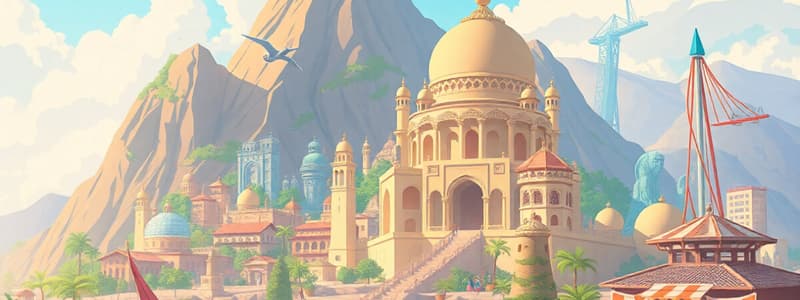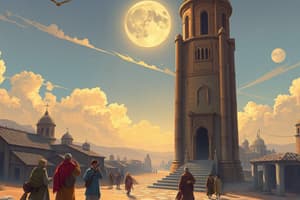Podcast
Questions and Answers
What is the primary purpose of tourism?
What is the primary purpose of tourism?
- To engage in commercial business activities
- To facilitate the movement of people for personal or business purposes (correct)
- To encourage cultural exchange among different societies
- To promote environmental conservation through travel
What was the significance of the 'grand tour' in ancient Roman times?
What was the significance of the 'grand tour' in ancient Roman times?
- It was an educational journey for young men of high standing (correct)
- It was primarily for leisure and relaxation
- It was a mandatory pilgrimage for all citizens
- It marked the beginning of commercial tourism
Who founded the first known travel agency?
Who founded the first known travel agency?
- Thomas Cook
- Richard Cox (correct)
- Chaucer
- Karl Benz
What milestone in tourism occurred in 1952?
What milestone in tourism occurred in 1952?
What impact did automobiles have on tourism?
What impact did automobiles have on tourism?
What was the first commercial packaged tour organized by Thomas Cook?
What was the first commercial packaged tour organized by Thomas Cook?
Which establishment was a precursor to modern all-inclusive resorts?
Which establishment was a precursor to modern all-inclusive resorts?
Which pilgrimage is considered a crucial religious journey for every believer in Islam?
Which pilgrimage is considered a crucial religious journey for every believer in Islam?
Flashcards
What is Tourism?
What is Tourism?
The movement of people to places outside their usual environment for personal or business purposes.
Early Tourism:
Early Tourism:
Traveling for leisure was once exclusive to royalty and the upper classes. It wasn't accessible to everyone.
The Grand Tour:
The Grand Tour:
Young men from high-ranking families embarked on educational journeys across Europe, experiencing different cultures.
Religious Pilgrimage:
Religious Pilgrimage:
Signup and view all the flashcards
First Travel Agency:
First Travel Agency:
Signup and view all the flashcards
Leisure Travel Agency:
Leisure Travel Agency:
Signup and view all the flashcards
Automobiles and Tourism:
Automobiles and Tourism:
Signup and view all the flashcards
The Jet Age and Tourism:
The Jet Age and Tourism:
Signup and view all the flashcards
Study Notes
Origins of Tourism
- Tourism is a social, cultural, and economic phenomenon involving people traveling to places outside their usual environment for personal or business reasons.
- Historically, travel was primarily enjoyed by royalty and the upper classes.
- The "grand tour" was a common practice for young men of high standing in the 17th century, involving travel through Europe.
- Religious pilgrimages, like the Hajj, have historically motivated travel for religious purposes.
- Cox & Kings, founded in 1758, is recognized as the first known travel agency, offering travel services to the British Royal Armed Forces.
- Thomas Cook, in 1841, established the first leisure travel agency aimed at broadening access to travel.
Tourism Becomes Business
- Thomas Cook started the first commercial package tours in 1845, including cost-effective railway tickets and printed guides.
- The development of automobiles, as seen in Karl Benz's wife's 1886 journey, increased interest in automobile travel and helped grow the automobile industry itself.
- The introduction of commercial air travel between London, Johannesburg, and Colombo in 1952 marked the beginning of the modern tourism industry.
- Club Méditerranée in the 1950s marked the start of all-inclusive resorts.
Tourism Development
- The 1960s saw increased competition among travel companies and an expansion in travel options for the general public.
- The growth of online travel booking sites like Expedia drastically changed the travel industry through the 2000s.
- Expedia, in 2018, had merged various brands and entities into one including Hotels.com, Travelocity, Trivago and other entities earning over $11.2 billion in revenue.
Interruptions to Tourism Growth
- Global events, like World War I, the Great Depression, and World War II, disrupted tourism growth.
- The 9/11 attacks, the Iraq War, fears of terrorism, and health scares (SARS, BSE, West Nile virus) significantly impacted international travel during the early 21st century.
- The COVID-19 pandemic is considered one of the most significant crises impacting tourism in modern history.
Studying That Suits You
Use AI to generate personalized quizzes and flashcards to suit your learning preferences.




